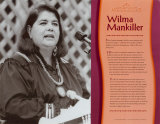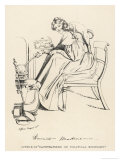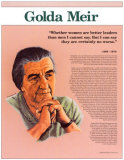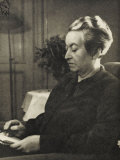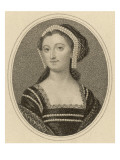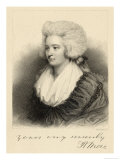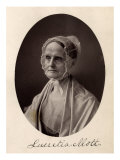|
|
|
|
|
Wilma Mankiller
b. 11-18-1945; Tahlequah, OK
d. 4-6-2010; Adair Co., OK (pancreatic cancer)
In the Cherokee language, Mankiller means someone who protects the village – a defender of the people. For Wilma Mankiller, chief of the Cherokees from 1985 to 1995, it is a fitting name.
Wilma was born in Tahlequah, Oklahoma, in 1945. Even though her family and the other people around her were poor, she was happy because she was surrounded by her Cherokee culture. When Wilma was 12, the U.S. government uprooted her family to San Francisco. The idea was to help Native Americans blend in with white society. But big city life was a shock to her family and they struggled to hold on to their Cherokee heritage. As a young adult, Ms. Mankiller grew interested in Indian politics and she eventually returned to the land where she was born.
In 1985, Ms. Mankiller became the first woman ever to serve as Principal chief of the Cherokees. Although at first some people did not want a woman for chief, they changed their minds when they saw how much she was helping the tribe. She brought new jobs to the area and helped poor women start businesses. She also improved the Cherokee court system and opened medical clinics. Chief Mankiller chose not to run for reelection in 1995, but she has stayed active in politics, speaking out for women's rights and the environment, as well as Native American issues. In 1998, Ms. Mankiller was awarded the Presidential Medal of Freedom – the nation's highest civilian honor.
• Every Day is a Good Day: Reflections of Contemporary Indigenous Women
|
|
|
|
Harriet Martineau
b. 6-12-1802; England
d. 6-27-1876
Writer Harriet Martineau was a philosopher, journalist, abolitionist and feminist. Because of her deafness, and being an “uneducated” woman, the founding of the science of sociology is attributed to Auguste Comte, and Martineau is considered the “first woman sociologist”.
FYI - An invalid much of her life, Martineau may have been the inspiration for the character of Mrs. Jellyby in Charles Dicken's Bleak House; and an early suitor was Erasmus Darwin, brother of Charles Darwin.
Harriet Martineau quotes:
• “The sum and substance of female education in America, as in England, is training women to consider marriage as the sole object in life, and to pretend that they do not think so.”
• “Laws and customs may be creative of vice; and should be therefore perpetually under process of observation and correction: but laws and customs cannot be creative of virtue: they may encourage and help to preserve it; but they cannot originate it.”
• “A soul preoccupied with great ideas best performs small duties.”
|
|
|
|
|
|
|
Golda Meir
b. 5-3-1898; Russian Empire (Ukraine)
d. 12-8-1978; Israel
Stateswoman Golda Meir -“Whether women are better leaders than men I cannot say. But I can say they are certainly no worse.”
Golda Meir quotes ~
• “Those who do not know how to weep with their whole heart don't know how to laugh either.”
• Heroes of the 20th Century posters
• Judaism posters
|
|
|
|
Harriet Taylor Mill, née Hardy
b. 10-8-1807; London, England
d. 11-3-1858; France (tuberculosis)
Harriet Taylor Mill, the wife of philosopher John Stuart Mill, published little of her work during her lifetime, however her writing reveals she had radical views on marriage and women's rights.
|
|
|
|
Kate Millett
b. 9-14-1934; St. Paul, MN
Kate Millett, a feminist writer and activist, is best known for her 1970 book Sexual Politics.
Kate Millett quotes:
• “Because of our social circumstances, male and female are really two cultures and their life experiences are utterly different.”
• “Many women do not recognize themselves as discriminated against; no better proof could be found of the totality of their conditioning.”
• “Politics is repetition. It is not change. Change is something beyond what we call politics. Change is the essence, politics is supposed to be the means to bring into being.”
• “The concept of romantic love affords a means of emotional manipulation which the male is free to exploit, since love is the only circumstance in which the female is (ideologically) pardoned for sexual activity.”
• “This country is becoming increasingly authoritarian. It's based on capital punishment.”
• “In those days, when you got boxed, that was it. A lot of old people were there because somebody wanted the farm. It was about property. People are treated like property.”
|
|
|
|
Gabriela Mistral
b. 4-7-1889; Chile
d. 1-10-1957
Chilean poet Lucila Godoy Alcayaga, known as Gabriela Mistral, was an educator who worked on behalf of homeless children in Mexico.
Gabriela Mistral quotes ~
• “We are guilty of many errors and many faults but our worst crime is abandoning the children, neglecting the fountain of life. Many of the things we need can wait. The child cannot. Right now is the time his bones are being formed, his blood is being made, and his senses are being developed. To him we cannot answer ‘Tomorrow’. His name is ‘Today’.”
• “Love beauty; it is the shadow of God on the universe.”
• Nobel Prize for Literature, 1945
|
|
|
|
Elizabeth Montagu
b. 10-2-1718; Yorkshire, England
d. 8-25-1800; London
Elizabeth Montagu, a social reformer and patron of the arts, was a leader in the women's social and educational movement made up of the privileged women known as the Blue Stocking Society. The name came about as an indication of the informal nature of the society - formal black silk stockings were not required.
• Elizabeth Montagu, the Queen of the Bluestockings
|
|
|
|
Maria Montessori
b. 8-31-1870; Chiaravalle, Italy
d. 5-6-1952; The Netherlands
Maria Montessori is best known today for the method of education she originally developed to teach underpriviliged children in urban slums. Montessori observed that these presumed “feeble-minded” children were inherently gifted with an “absorbent mind” and would flourish in prepared environments with age sensitive activities that involve exploration, manipulations, order, repetition, abstraction, and communication.
Montessori, the first woman to earn a medical degree in Italy (1896), was nominated for the Nobel Peace Prize in 1949, 1950, and 1951. Montessori died 5-6-1952. The year 2007 marked the 100th anniversary of Montessori education.
• more Montessori posters
|
|
|
|
Hannah More
b. 2-2-1745; England
d. 9-7-1833
Hannah More, a teacher, religious writer, philanthropist and social reformer, was one of the most influential women of her day. She associated with the intellectual society of England: actor and playwright David Garrick, painter Joshua Reynolds, Samuel Johnson, Edmund Burke, and Elizabeth Montagu (Blue Stocking Society); later she influenced abolitionist William Wilberforce. She was accused of “Methodist” tendencies for teaching farm children to read because workers who could read would would leave the farms and that would be “fatal to agriculture”.
• Hannah More: The First Victorian
|
|
|
|
Lucretia Mott
b. 1-3-1793; Nantucket, MA
d. 11-11-1880
Lucretia Mott (née Coffin) was educated at a Quaker boarding school and eventually became a teacher. She was drawn to activism when she discovered the male teachers were paid twice as much as the women teachers.
Mott, with Elizabeth Cady Stanton, was a principal organizer of the first women's rights convention held in Seneca Falls, NY., and a signer of the Declaration of Sentiments. She was also an abolitionist and one of the founders of Swarthmore College in 1864.
Lucretia Mott quotes ~
• “It is not Christianity, but priestcraft that has subjected woman as we find her.”
• “The cause of Peace has had my share of efforts, taking the ultra non-resistance ground - that a Christian cannot consistently uphold, and actively support, a government based on the sword, or whose ultimate resort is to the destroying weapons.”
• “It is time that Christians were judged more by their likeness to Christ than their notions of Christ. Were this sentiment generally admitted we should not see such tenacious adherence to what men deem the opinions and doctrines of Christ while at the same time in every day practise is exhibited anything but a likeness to Christ.”
• “I have no idea of submitting tamely to injustice inflicted either on me or on the slave. I will oppose it with all the moral powers with which I am endowed. I am no advocate of passivity.”
• “If our principles are right, why should we be cowards?”
• “The world has never yet seen a truly great and virtuous nation, because in the degradation of women, the very fountains of life are poisoned at their source.”
• Lucretia Mott
• A Very Dangerous Woman: Martha Wright and Women's Rights (Lurectia Mott's sister)
|
|
|
|
Mourning Dove
b. 1888; Idaho
d. 8-8-1936
Mourning Dove was the pen name of Christine Quintasket, an Okanogan Indian of the Northwest coast. She put her mission education to use in the service of her native culture by becoming an important chronicler of the life ways of her people, thus preserving knowledge that might have been lost. Mourning Dove’s best-known book, Coyote Stories, first published in 1933, is one of the first collections of native stories that was gathered and transcribed by a Native American.
|
|
|
previous page | top | next
activist list | a | b | c | d | e | f | g | h | i-j | k | l | M | n-o | p | r | s | t-u-v | w-z >
Pioneers of Women’s Rights Movement Posters
|
|
I have searched the web for visual, text, and manipulative curriculum support materials - teaching posters, art prints, maps, charts, calendars, books and educational toys featuring famous people, places and events - to help teachers optimize their valuable time and budget.
Browsing the subject areas at NetPosterWorks.com is a learning experience where educators can plan context rich environments while comparing prices, special discounts, framing options and shipping from educational resources.
Thank you for starting your search for inspirational, motivational, and educational posters and learning materials at NetPosterWorks.com. If you need help please contact us.
|
|
|
|







